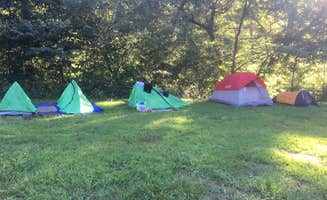Tent camping near Plato, Missouri centers on the Ozark plateau region at elevations between 1,000-1,400 feet with humidity levels reaching 80% during summer months. Most primitive sites in the area experience dramatic seasonal changes with spring flooding common along riverways and fall temperatures dropping to near-freezing by late October. Winter camping remains available at select locations though water access points may close from November through March.
What to do
Fishing opportunities: Cedar Grove/Dee Murray Backcountry Camping provides access to trout fishing in clear streams. Lisa S. notes it's "good for wading and trout fishing" and "a beautiful place to float with the family," though campers should prepare for a "large hill to get to the porta potty."
Swimming at natural features: Rymers Backcountry Camping offers swimming holes with natural rock formations. According to Glen T., the area has "a great swimming hole and beautiful scenery with nice tall cliffs" and "a couple big rocks out in the water you can swim to and jump off of."
Picnicking day trips: Noblett Lake functions primarily as a day-use area rather than overnight camping. Dave R. states it's "nice for a picnic" while Stephanie B. clarifies, "This is not a campground. If you want to camp, DO NOT GO HERE. It is a lovely day use area."
Winter camping considerations: Most riverway campsites operate seasonally with limited access during colder months. Lula L. mentions that at Rymers, "in October after closing can be solo camping" and the area becomes "free in off season," though road access becomes more difficult.
What campers like
Affordability and privacy: Rippee Conservation Area offers free camping with basic amenities. Ashlin S. reports, "It's free, and it's about as nice as you can expect from a free campground," while Glen T. adds it has "not many campsites, I believe only four but it does have firepits and grills."
River access proximity: Akers Group Campground features direct river access from campsites. Aimee T. explains there's "a very short path from the site to the current river, which is beautiful" and appreciates that Group Site Three is "HUGE, and nice and level."
Water quality and clarity: Rymers Backcountry Camping stands out for exceptional water clarity. Lula L. describes "blue green crystal clear water" and notes the "long beautiful drive in" though cautions about access limitations: "narrow road would not recommend for motorhome over 20' or any large camper as there is no backing up or turn arounds."
Wildlife viewing opportunities: Multiple campsites offer chances to observe local fauna in relatively undisturbed settings. Kevin T. notes that at Noblett Lake, "There is plenty of wildlife around and a lake not too far away from you," making it suitable for nature observation during daylight hours.
What you should know
Road access limitations: Some sites have restricted vehicle access. For Rymers Backcountry Camping, Lula L. warns about the "narrow road" and specifically states not to bring "motorhome over 20' or any large camper as there is no backing up or turn arounds."
Site maintenance schedules: Campground maintenance varies by location and season. At Akers Group Campground, Aimee T. observes, "My ONLY complaint is that they never seem to cut the grass close to when we come. It's not terrible, just a weedy and a little longer than I'd like it to be for tent camping."
Campground closures and status changes: Sycamore Loop Dispersed camping area has undergone significant changes. Jen reports, "Pretty much all the campsites listed in this area have been turned into day use only/No camping here spots. The gate to go down towards this campsite was locked."
Seasonal availability variations: Access and facilities change throughout the year. Akers Group Campground operates from April 15 to October 16 with drinking water and trash collection only during this period. Other sites may remain accessible year-round but with reduced services.
Tips for camping with families
Site selection for young children: Choose campgrounds with gentle water access. Cedar Grove/Dee Murray is described by Lisa S. as "a beautiful place to float with the family" while being "very primitive" so families should prepare accordingly.
Quieter locations for family camping: Rippee Conservation Area offers a more peaceful environment. Glen T. describes it as "a very great family friendly campground" that's "really quit and nice" with limited sites reducing noise from other campers.
Advance planning for amenities: Bathroom facilities vary significantly between locations. Cedar Grove requires campers to "walk up a large Hill to get to the porta potty" according to Lisa S., while other locations may have no facilities at all, requiring families to bring portable options.
Water safety considerations: Families camping with children should note that riverways can experience rapid changes. Glen T. mentions that Rymers has "nice tall cliffs" and rocks to jump from, requiring appropriate supervision for younger campers.
Tips from RVers
Length restrictions for access roads: Cedar Grove/Dee Murray Backcountry Camping has limitations for larger vehicles. While RVs are permitted, the access roads and camping areas favor smaller rigs, with campers describing the area as "remote" with primitive facilities.
Site leveling challenges: Josh notes that at Sycamore Loop, "most spots no longer seemed camp friendly, as new tree growth has taken over," making it difficult to find level spots for setting up camp even with smaller recreational vehicles.
Long-term occupancy awareness: Some dispersed camping areas may have unofficial long-term residents. Josh observed at Sycamore Loop that "there seems to be a guy living in an RV at the end of the road which is really close to the one camping friendly spot, kinda kills the dispersed camping vibe."


